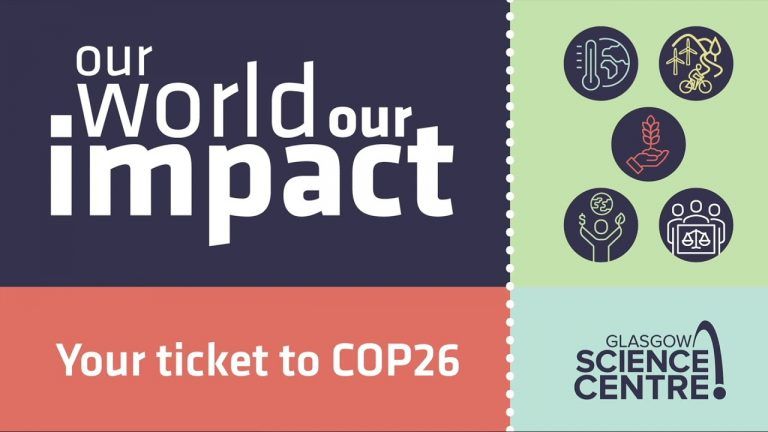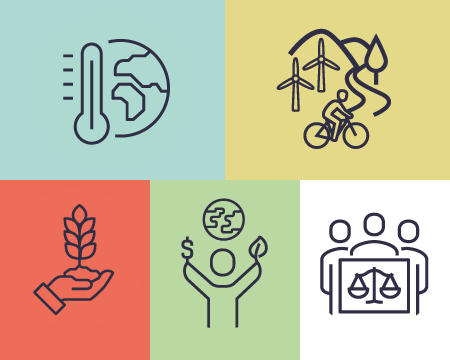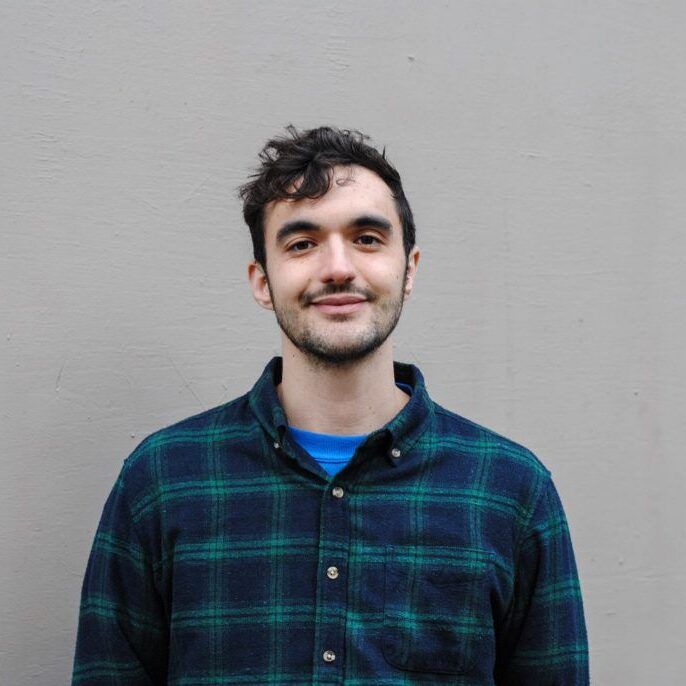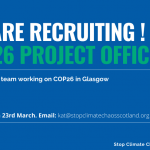When COP26 comes to Scotland next year, Glasgow Science Centre (GSC) will be at the centre of activity. It’s not only right opposite the Scottish Events Campus (SEC), where COP26 will be taking place, but it is also the location of the Green Zone. The Green Zone is a designated area during COP26 that is open to the public and will be full of events, activities and exhibitions. But until COP next year, many organizations including GSC will be running online events to build momentum for the 1st-21st November 2021.

To galvanise Glasgow, GSC have launched Our World, Our Impact; an event series that brings the Science Centre to the public, along with an array of interactive online events and educational videos. To learn more about this exciting set of events, Climate Fringe talked to GSC Programme Manager Emma Woodham about the upcoming year.
CF: Hello Emma! To start, what are you most excited about for the event series Our World, Our Impact?
EW: We are excited about Our World, Our Impact because we feel that COP26 should happen with people not to them. We are making use of a whole host of digital channels and other formats to reach people in these unusual times.
I’m a big foodie so I’m loving the fantastic recipes submitted by fantastic Chefs Gary MacLean, Julie Lin and Rachna Dheer as part of our Scarps campaign – you can check these out on the Our World Our Impact Hub on our website.
CF: What other events can people look forward to?
EW: Since we launched the programme on the 26th of October, we have launched 3 of the 5 key themes of Our World, Our Impact – Our Planet, Climate Justice and Food. Next year we will have a packed programme that continues the conversation of each of these themes, including a live digital climate festival going live on the 18th of February called Curious About: Our Planet. We will also be launching our Energy, Transport and Travel and Green Futures themes. We will be discussing the Just Transition in partnership with the University of Strathclyde, and exploring a greener, happier and healthier future through storytelling.

CF: Why did you choose to call the campaign Our World, Our Impact? What is the intention behind the language used?
EW: We don’t want to change what people know about science, but how they feel about it. Climate change is a complex and daunting topic and we feel it’s easy to feel overwhelmed and switch off to the climate crisis. This programme is about making climate science relevant and accessible to our day to day lives.
CF: Climate justice is at the heart of the project. If you had to describe the term to somebody who had never come across it, how would you do so?
EW: We have been lucky to partner with Tahseen Jaffry and her team at the Centre for Climate Justice at Glasgow Caledonian to explore the topic of Climate Justice. In our Climate Justice Launch Video, Tahseen explains:
‘There is no doubt that our climate is changing and it’s also very clear that it is the poorest and most vulnerable people who have contributed least to climate change that are being affected the most, and this is what we see as a climate injustice’
CF: What do you hope to achieve in the run up to COP26?
EW: This is an incredible year for Glasgow, and for the UK as a whole. We want to play our part in making this a successful COP by raising awareness of what the conference is, and for everyone to take action now to tackle the climate crisis. The Our World, Our Impact programme extends an invitation to everyone to seize this once in a lifetime opportunity, so we all play our part in fighting for a greener, fairer future for all.
CF: What has been the biggest challenge facing GSC in the last year?
EW: Well we all know that 2020 has been a bit unusual! And things have been no different here at GSC. We would usually welcome nearly 400,000 people into GSC in a year, but this hasn’t been possible. However, we have seen these challenges as an opportunity to serve our audiences in new ways, and also to reach new people too. In addition to launching the Our World, Our Impact programme, we also created a family science magazine which is distributed throughout Glasgow. We also posted a fun science activity every day at 10am throughout lockdown and it was fantastic to see everyone doing science in their own homes.
CF: What sort of responses have you had to the events series so far?
EW: Since launch in October, this programme has now reached over 400,000 people from different parts of society – school pupils, teachers, community groups and families. We have had people engaging with the programme from all over the world, including Brazil, South Africa and China. We have also had incredible support for our partners to host lots of different activities which we are very grateful for.
CF: What do you know about what might be in the Greenzone during COP – can you give any sneak previews?
EW: We are very excited to be hosting an official COP zone – the Green Zone which will give delegates and the public that chance to explore a huge programme of events and experiences during the two weeks of COP. This is separate to the Blue zone which is open to accredited delegates only. The programme in the Green Zone is curated by the UK Government, and the portal for proposals will be opening early in the new year so keep your eyes peeled!
CF: Do these events give you hope for the future?
EW: By creating and delivering this programme we have had the privilege to work with incredible organisations and individuals and host conversations with a diverse range of voices. There is so much good work happening, and a real appetite for change. This fills us with hope, and we are certain that 2021 will be an exciting year to work together to create the world we want to see.

Nick Cullen
Nick is a past coordinator for the Climate Fringe platform and Climate Fringe Festival, working on strategy, website development and communications. He spent two years at SCCS in the lead up to COP26 and led on developing the Homestay Network, volunteering programme, COVID-19 safety, and many other aspects of logistics and operations in collaboration with the COP26 Coalition.





